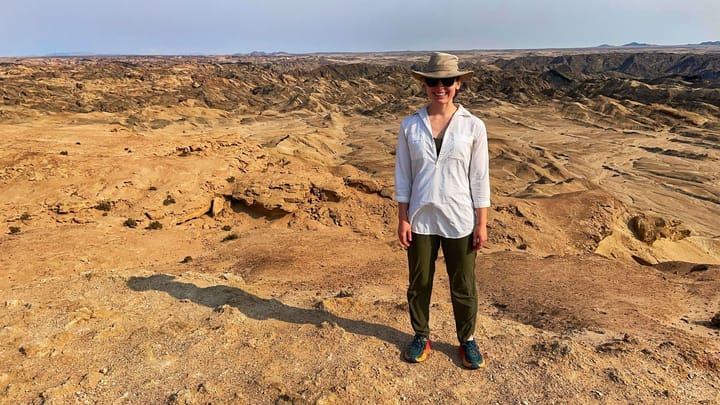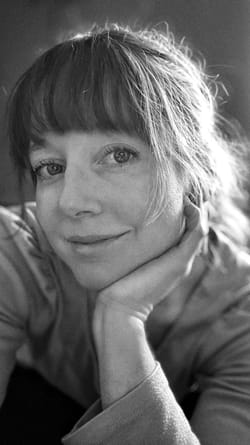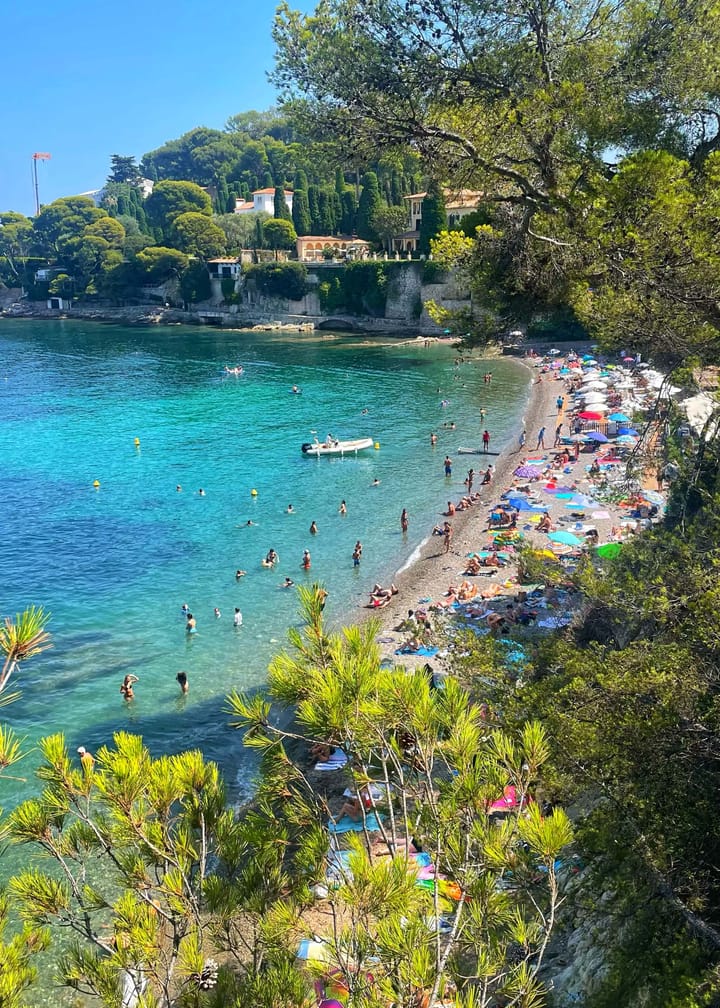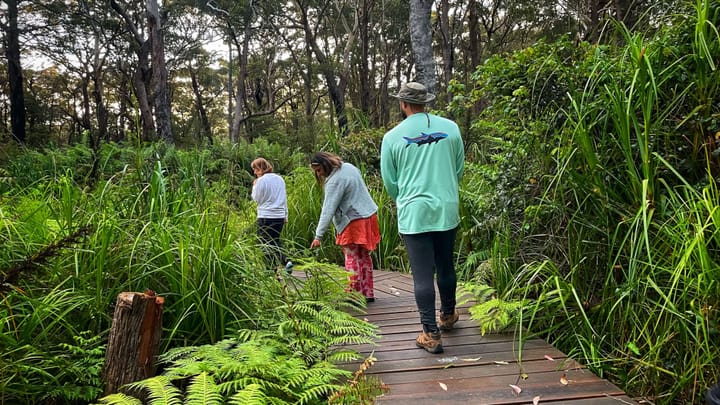I left Botswana headed to Namibia's Caprivi Strip. A little runway of land north of Botswana's Okavango Delta, I hoped it'd be easier to see the wetlands from the Namibia side. (It wasn't.)
Getting there wasn't easy either.
I took a kombi (Botswana's shared taxi) from Maun to the Mohembo border, and walked inside the airy room to get my passport stamped. It was the first border office I had crossed in my entire five months backpacking Africa that was completely empty – except for three guys on the opposite side of the room going the other way.
The woman behind the counter was friendly – another first – and chatty. Except we discovered one problem with my plan: there were no shared taxis or buses waiting on the Namibia side to take me to town. She turned around, and in a language I couldn't understand, started bantering back and forth with the men, gesturing at me and using a tone that sounded a lot like a mother telling her boys to be good.
"Only one of them is crossing to Botswana. The other two are going back to town. They'll take you."
I thanked her profusely, and in the end, the two older gentlemen dropped me off at my camp, a slight detour on the way to town. They wanted money, but I hadn't been to an ATM yet, because we didn't go to town. When they realized the predicament, they shrugged and said something to the effect of: the grace of helping a stranger would come back their way.
I know how dogs feel riding in the back. Free. 🐶
I was surprised by the outcome; this perspective wasn't something I had witnessed much during my time in Africa. I suspect that given how much white people have taken from them, there is less grace to give to people who look like me.
But the experience reminded me of the first time I hitchhiked in Africa, where a moment of vulnerability opened the door to an unexpected connection.
Here’s the story of how I – an early 30’s petite white woman who most Africans confused for a child – ended up sandwiched between two construction workers from the Uganda Wildlife Authority while hitchhiking 125 miles up the western side of the country.
And no – my parents did not know where I was.
All that anyone knew was that I was either dying, or having a premature midlife crisis. After years of struggling with health issues, I had decided a few months earlier that I needed to start living my life before it was too late.
Now, most people in my circumstance would make a lavish purchase or get a regrettable tattoo. As for me?
I decided to backpack Africa.
“I’m starting in Uganda, and working my way down to South Africa,” is what I told everyone’s raised eyebrows.
I’d have shared more but – well, that was about as much as I had figured out.
I’m now one week into my trip and already my lack of planning is beginning to make me question whether this was the “life” I was looking to live. I had certainly thrown myself into an adventure – but perhaps what I was looking for wasn’t excitement, so much as meaning.
It is a warm, Friday afternoon and I am squished against the door of the passenger seat of an 8-seater van while a man whose job it is to collect money sits next to another man whose job it is to drive all 13 of us – plus a baby – about two hours into the Bwindi Impenetrable Forest.
This is what is known in Uganda as a matatu (shared taxi), and there’d be more of us squeezed into the car, if there were more needing a ride. I’ve paid double for my seat for “extra room.” Apparently, “room” still includes an extra person where there is no middle seat, perched precariously on a stool while reaching his arm across my face to steady himself with the grab handle. Deodorant doesn’t seem to be a thing men wear in Uganda, so I press my nose into my backpack, which is clutched around my chest like a security blanket. There are no seatbelts, so I’m hoping that me, and the contents of my stomach, remain down on this bumpy, smelly ride.
As we ascend into the misty mountains, swerving around potholes in the red dirt road, I inquire with the driver about the journey to my next destination.
“I can take you,” he replies a little too eagerly. “What day?”
“Sunday.”
He lets the air out of his mouth, feigning that I’d be putting him out. “It will be a high price, private ride.”
“Why not this ride, for the same price I pay now?”
“We don’t work on Sundays.”
Ah yes, I realize. It is Sunday and – thanks to colonizers who looked like me – in Uganda, it is a day of rest.
Even so, I glance back at the other passengers, looking to see if any faces betray a lie from the driver – surely workers need to go home on their day off? – but everyone is staring blankly ahead. I fix my gaze on the white Jesus decal plastered to the side of the back window. He stares at me solemnly.
You did this, he says.
No, we did this, I reply in my mind, reminding him that he has blood on his hands, despite what the women said outside of the tomb.
The whites brought religion to Africa – and all of the shame and guilt that comes with it. But Jesus started it. Without Jesus, there wouldn’t be a Son Day of rest. Without Jesus, perhaps white people would have brought Sabbath, and with Saturday off – I’d have a ride.
I narrow my eyes at white Jesus in condemnation while the driver quotes me a sinful number. Even with the conversion to U.S. dollars, it’s way too much – and we both know it.
Is this what you died for? So this man can be saved from his greed while a little lost lamb is stranded in the jungle?
“I’ll find my way…” I say unconvincingly, hoping to figure out another plan before Sunday.
“Here’s my number if you change your mind.”
I didn’t.
Instead I found myself trusting in the kindness of three different groups of strangers – and learning the true meaning of Ugandan hospitality.
I didn’t intend to hitchhike.
I’ve seen enough stories about women being kidnapped, albeit in the U.S., but I’ve never hitchhiked before, and I didn’t intend to start in Africa.
Here’s how I thought it would go: On Saturday, I would have a memorable day tracking gorillas in the forest with other tourists staying nearby, and after, I’d casually ask, “Where are you headed after this?” Someone would name my destination, I’d say, “Me too! Want to share a taxi?” to which they’d obviously guffaw at the fact that I don’t have my own transportation and offer an extra seat in their car, which I’d gladly accept, apologetically, graciously, while in exchange, offering money for petrol.
Turns out, no one was going where I was going.
“You could stay until Monday, then get the same matatu back to town,” the manager of my lodge suggests.
“And then a bus to Kasese?”
He chuckles. “It will be a few buses – there isn’t a direct route. A matatu will go the whole way.”
“How much?”
He shrugs – the shrug that we both know means, you’ll pay more than I would, and I don’t know the American price. “Depends on what they will charge.”
I hang my head in defeat, and he seems to take pity on me, because then he nods in the direction of a tourist group in the dining room.
“I think they’re going to Queen Elizabeth tomorrow. You could go with them, and then get on another tourist van going from Queen Elizabeth to Kasese. That’s the tourist circuit.”
I nod. His plan makes sense to me. And it seems safe hitching rides with two tourist vans – arguably safer than the matatu.
I make my pitch to the group. The leader seems skeptical, but the others seem enthusiastic, and he caves.
“Be ready for 8.”
If I thought the ride into the mountains was bad, the ride out was worse.
The road going north from the forest is not often used, and thus not maintained. There was more room to breathe with the tourists – which meant we bobbled around the cabin every time the car smacked a pothole. The AC wasn’t working in their van either, so with the windows rolled down, a bad bump also sent a wave of red dust into the car, leaving us coughing and clearing the grit out of our noses.
My new Catalonian friends who don't speak very good English are attempting to show how dirty our tissues are from the wave of dust that just came in the windows — and up our noses.
“Enjoy your free African massage,” the driver hollers back at us, and we do. Somehow the group interprets the experience as delight, not discomfort, and their giggles are infectious.
They are to drop me off at a gate in the middle of the park, the last one they will pass before turning to their own camp. Driving through the park, we see blue monkeys, and the famous tree-climbing lions.
A free safari. I smile at my good fortune.
We reach my gate in the early afternoon, and they wish me luck with the rest of my journey. “Let us know when you make it to your destination!” I assure them I will.
As they drive away, I approach the Uganda Wildlife Authority guards at the gate.
“I am looking to get to Kasese,” I explain. “But if a tourist van is only going to Katunguru, that is okay too, and I can catch a matatu from there.”
The guards stare at me, with concerned looks on their faces.
“You do not have transport?” one of them clarifies.
Uh oh. My “plan” appears to be more of a “predicament.”
“No.”
They look at me incredulously.
“Um, my lodging recommended that I do this and they said that it wouldn’t be an issue...”
The guards look at each other.
“We will ask everyone who comes through the gate for you,” one of them offers. “Have a seat over there.”
I find shade, lean on my backpack, and open the book I am reading, The Kindness of Strangers. A little on the nose, I realize – until I read about a hitchhiking couple who survived a ride with a modern day Bonnie and Clyde. Please don’t let this be foreshadowing.
Some time passes – but no tourist vans do. I hear the guards radioing about my situation. Was this a huge mistake? Worry creeps in. I don’t have a plan B. The guards don’t even think this is a plan A. I take a deep breath and send out a silent prayer that a ride will come soon.
It is around 4 P.M. when the guards approach me again.
“So, where are you from?”
“The United States.”
“Your English is very clear,” one says. “We can understand everything.”
Diction, ever since I sang in a children’s choir with a strict choirmaster, has always been my strength, and I am glad it is appreciated.
A UWA construction truck pulls up to the gate behind them.
“This truck is going to the other side of the park,” one says. “You will go with them.”
“Katunguru?”
“Near, yes,” he affirms.
“Hurry up! We’re off for the day!” one of the men in the carriage shouts as two men hop down from the truck bed and toss my bag up before I can object.
Next thing I know, I am answering the eager questions of a construction worker named Robert, whose perfect English stuns me, given that most Ugandans with that command of the language wind up working in tourism for the money.
Perhaps Robert did work in tourism once, or perhaps he doesn’t care for the whims of tourists and chose construction work instead, because soon he starts pointing out animals we see along the way, telling me everything he knows about them. It is clear that he loves working for the park, and I smile, in awe of my day.
Two free safaris in one day? I should hitchhike more often!
We pass baboons, and Robert gestures at the shattered windshield of the truck.
“They are responsible for that,” he says, shaking his head. “Someone left a snack inside overnight.”
Riding through Queen Elizabeth Park.
We see a warthog – which I am told is rare in the park – along with a red-tailed monkey, and a black and white colobus monkey.
“The colobus are rare to see here,” Robert explains, “because there aren’t many left as the villagers kill them and use their fur for traditional dances.”
We see many varieties of antelope, including a bushbuck.
“Extremely rare!” Robert exclaims in surprise, “It is a sign of good luck to see one! This antelope likes to be alone.”
“Then it is me,” I tell Robert.
He smiles. I smile back, bathing in his unbridled joy at spotting all of these “rare” animals.
“How old are you?” he asks.
“Guess.”
“24,” Robert says with certainty.
“31,” I reply. Robert and the driver are both 50.
“You are my daughter now,” Robert says matter of factly.
My heart eases at the safety I feel with his remark, and I silently express gratitude to the universe for how my day has fallen into place. I gaze at the beautiful landscape and want to ask Robert, Do you believe in God? But I hold back, worried that it might ruin the moment with an uncomfortable conversation.
Not 30 seconds later Robert looks at me pointedly.
“Are you religious?”
I nearly fold to the floor at the synchronicity.
“There is a higher power,” I tell him – and myself – laughing. It is undeniable in that moment. “I don’t subscribe to any particular religion myself, though I was raised in the church and did go to a Catholic university.”
Robert’s face lights up again. “I’m Catholic!”
I have met many Christians, but not many Catholics, in Uganda, and I reckon he is as surprised as I am. We fall silent again, continuing to soak in the wonder of the present moment, each other’s pleasant company, and the landscape created by some invisible, magnificent force that we both know in our hearts exists.
Two hours pass like this before they drop me at the other end of the park.
“Your journey with us has come to an end,” Robert says with finality, and sorrow.
I thank him profusely.
“You are a guest in our country,” Robert tells me. “We make sure guests are taken care of.”
I hop out of the truck, and Robert leans his head out of the window.
“The cars must stop here for a checkpoint,” he says, assuaging my concerns, “so you will find someone here to take you to Kasese.”
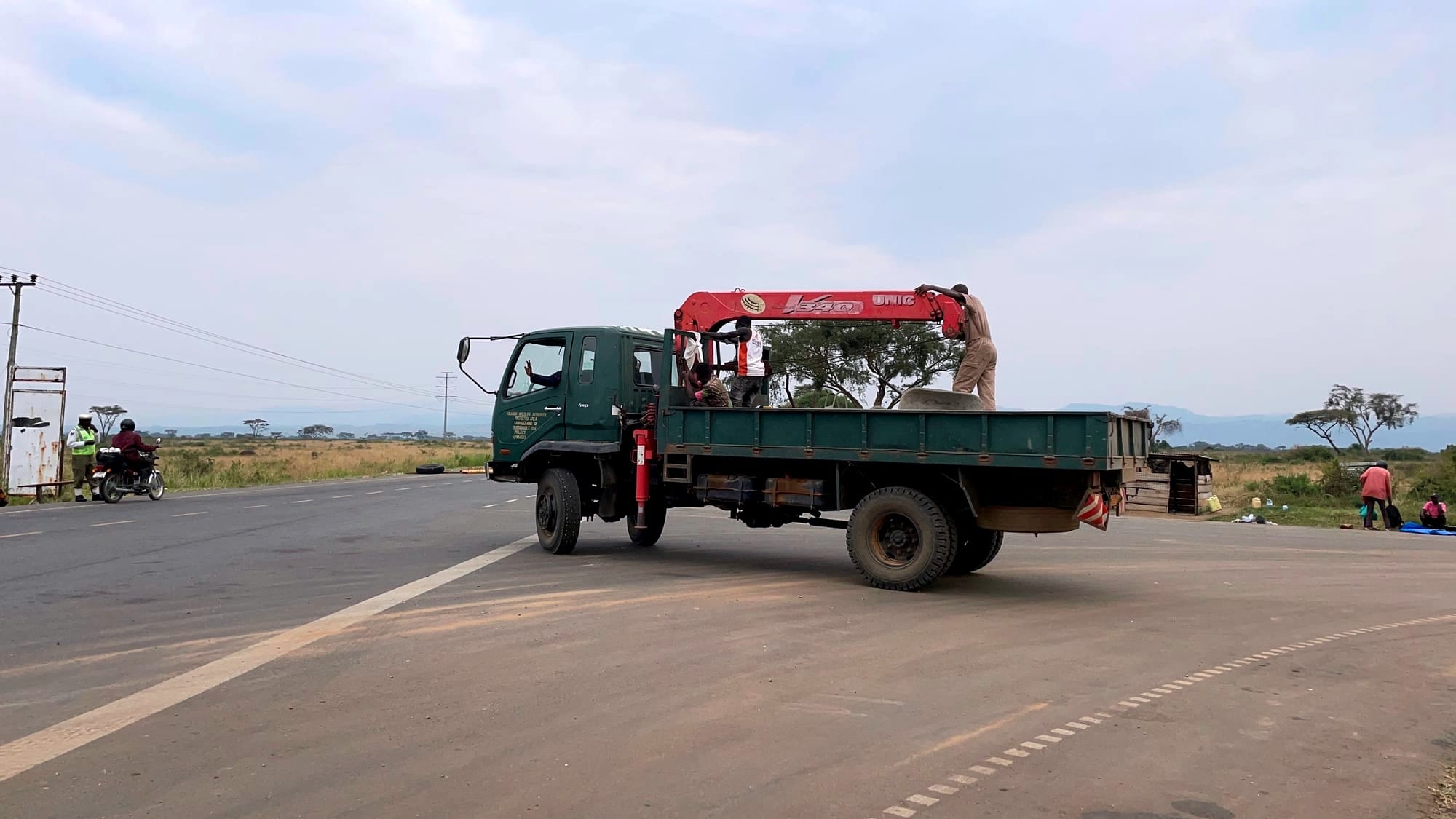
And then, with that, the men in back pass down my bag, and they are off.
Many cars pass, but none empty enough to take me. Eventually a man in an unusually flashy car with many kids in the back offers to drop me all the way at my next accommodation. “Where in Kasese town?” he asks.
I don’t have accommodation booked, but I don’t tell him that. Instead I say the first place that comes to mind.
“White House Hotel.”
“I know it,” he replies. “I will take you directly there.”
It turns out I am not the only hitchhiker in the car – and both of them want my number. I get theirs instead, pretending that I don’t have a Ugandan SIM card. I learn that the three kids in the car belong to the driver, who is Ugandan, but lives in Rwanda, coming every so often to visit them, and take them on outings. I gaze out the window mostly, as the scenery shifts once again from savannah to mountains. From mountains to jungle to savannah to mountains I go. A 4.5-hour journey on Google Maps that in the end takes more like 7, plus the time spent waiting for a ride.
“We do not litter on this trail of animals,” the driver chastises his kids, who are throwing empty chip bags out the window. Pulled out of my day dream, the irony strikes me. The whole world is for animals, for that is all we are. Animals with egos, stupid enough to litter in our dwelling places, sensitive enough to know that it is bad for the wild.
We would do better to know our own wild. To remember that we were given consciousness to be stewards of creation.
He takes me to the White House, and I make a vague promise to contact him the next day. And then I get myself a room, while the girl at the front desk sizes me up and says, “You will take a shower now?”
I chuckle at the implication of her words, and assure her, yes.
I may be unclean, but my heart is pure. They may not work on Sundays – but grace does.
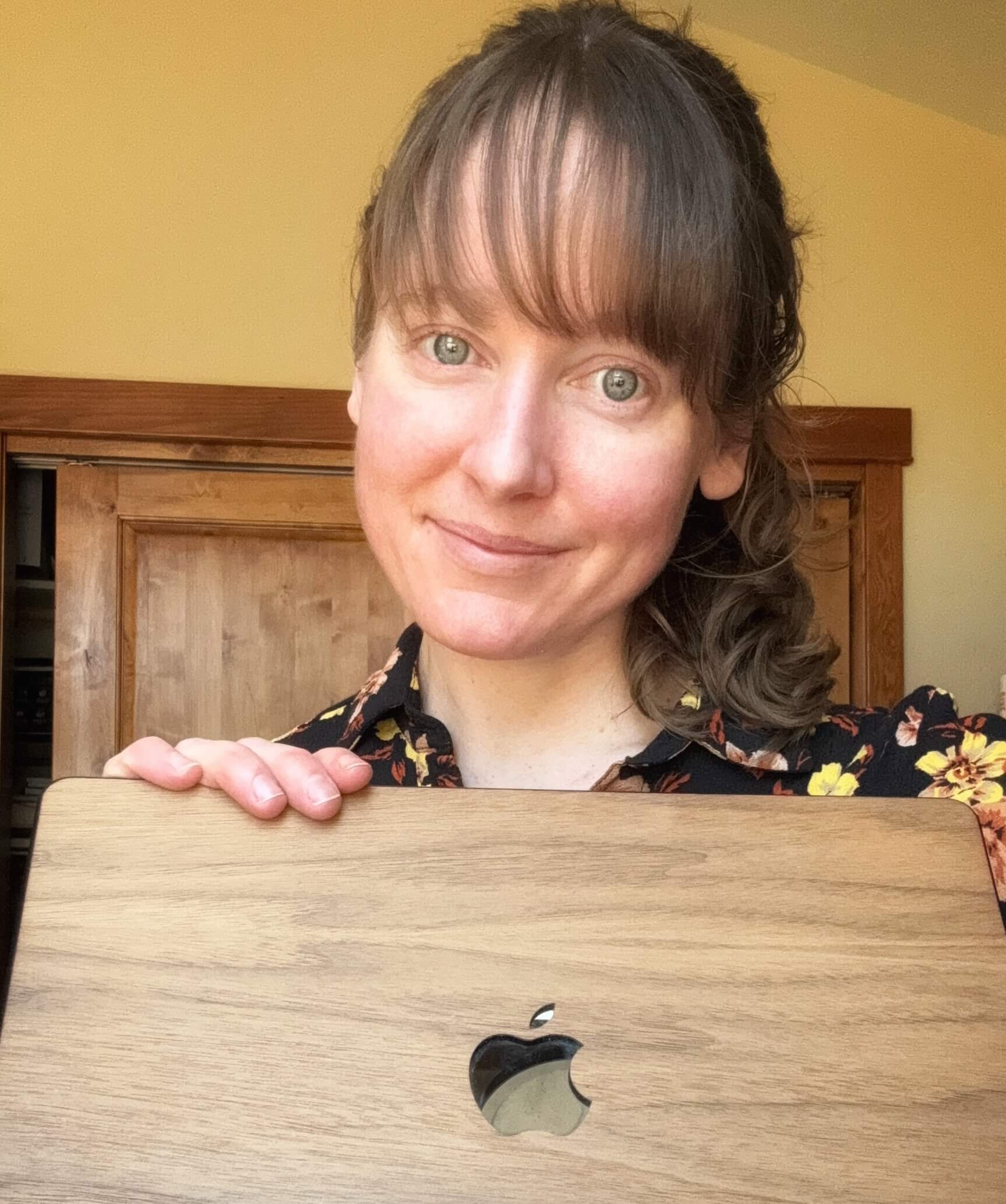
Your support will help me keep writing.
I love writing this newsletter to you each week. If this newsletter brings you as much joy as it brings me, please consider making a one-time contribution. Your financial support will help me continue writing it to you. Any amount is appreciated!
